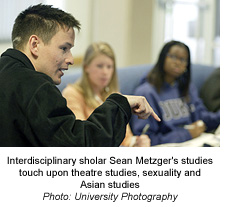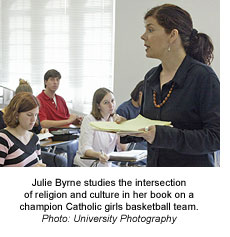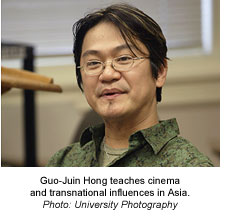|
 Duke Faculty Members Explore What's Behind the Culture
of Our Times Duke Faculty Members Explore What's Behind the Culture
of Our Times
By Blake Dickinson and Sally Hicks
Choose a profile:
Julie Byrne | Mark Anthony Neal | Sean Metzger | Guo-Juin Hong
 Julie Byrne, Julie Byrne,
Department of Religion
 Watch the Video Watch the Video
Perhaps no subject better exemplifies the liberal arts than the study of religion “as it is lived,” according to assistant professor of religion Julie Byrne, a three-time Duke degree recipient who joined the faculty this fall after four years teaching at Texas Christian University.
“If liberal arts at their best teach students to question assumptions and construct creative answers, religion – people’s most treasured assumptions and deepest habits of living – is a paradigmatic humanities subject,” she said. “Religion is never what it appears to be on the surface or in the abstract. Instead, it is a multifaceted thing that works in several different ways in a person’s life.”
Byrne, who grew up in Pennsylvania and is the daughter of a religion professor at Lebanon Valley College, was an A.B. Duke scholar as an undergraduate. She majored in Medieval & Renaissance Studies and religion before graduating in 1990. After selling fish for two years at Whole Foods Market in Durham – “I can still fillet and bone out a salmon,” she bragged – Byrne entered the graduate program in religion at Duke, earning her master’s degree in 1996 and her Ph.D. in 2000.
While interested in many aspects of religion, Byrne’s scholarly attention in graduate school shifted to contemporary American religion.
“I do think the intellectual life for me is engaged by what is going on around us all the time,” she said, adding that interviews with religious practitioners are a crucial part of her research. “I do think my colleagues who study medieval Europe and ancient Hinduism are all contributing to our contemporary life, but for me it has to be more concrete. What I’m interested in is looking at religion and how it is really experienced by its adherents.”
An interest in the intersection between religion and culture evolved into a doctoral thesis on sports participation by Catholic school girls, hundreds of interviews and a book. O God of Players: The Story of the Immaculata Mighty Macs (Columbia University Press, 2003) looked at a small, Catholic school 30 miles west of Philadelphia that won the first three women’s national college basketball championships ever played.
Catholic girls’ schools are usually depicted as oppressive, stifling institutions hearkening back to the 1950s, Byrne said, but that is not what she found when she started doing research and talking to former players.
“It was also a life that had a lot of fun and joy,” she said. “And a big part of this was because of basketball.”
While many young women in co-ed public schools in the first half of the 20th century were often discouraged from actively participating in extracurricular activities, Catholic girls around Philadelphia had been playing varsity basketball, leading debate teams and being elected to student government.
Basketball for girls “took on cultural legitimacy in the Catholic community,” Byrne said. “It took hold and a tradition was born before anyone even looked. This is what created a foundation.”
After four years in Texas, Byrne returned to Durham this fall and moved into an East Campus residence hall as a faculty-in-residence. She shares her Randolph Hall residence with her brother and sister-in-law.
“I felt like it would be a way to get at the level of student interaction I would try to accomplish anyway,” Byrne said of the housing arrangement, which includes regular lunches, community service and trips to various houses of worship (from a Pentecostal church to a Buddhist temple) with first-year students.
She said the students don’t seem intimidated to live with a religion professor. “Once students understand that neither religion nor divinity professors have any special claim on virtue, they’re fine. After all, I’m not their local priest looking over their shoulders.”
back to top
 Mark Anthony Neal, Mark Anthony Neal,
African and African-American Studies Program
When Mark Anthony Neal was growing up, he thought his dad’s music was old-fashioned.
The Mighty Clouds of Joy? R&B? The blues? Neal wasn’t interested. He wanted to hear the Jackson Five; Earth, Wind & Fire; and ’70s soft rock.
But today he credits his father – a 10th-grade dropout – with inspiring his intellectual career as a scholar of black culture, particularly soul, R&B and hip hop music. He also looks at race and film and television.
“The connection to my father was the music,” said Neal, an associate professor in African and African-American studies. “I think of him as the person who introduced me to this whole terrain.”
He also is indebted to established African-American scholars such as Cornel West and Michael Eric Dyson. “They were superstars,” he said. “They made the life of the mind sexy.”
In his scholarly work, Neal addresses such issues as the political content of black popular music, aesthetic practices and the sense of community expressed in music.
Since getting his Ph.D. in American studies from the State University of New York (SUNY) at Buffalo, he taught at the SUNY-Albany, and the University of Texas at Austin before coming to Duke.
Neal is the author of four books: What the Music Said: Black Popular Music and Black Public Culture; Soul Babies: Black Popular Culture and the Post-Soul Aesthetic; Songs in the Key of a Black Life: A Rhythm and Blues Nation and That's the Joint! The Hip Hop Studies Reader (with Murray Forman).
His next book, NewBlackMan, will be published in 2005. Neal’s essays also have been anthologized in more than a half-dozen books, including the 2004 edition of Da Capo Best Music Writing.
He writes a column called “Critical Noire” for AOL BlackVoices.com and is a regular contributor to SeeingBlack.com and Popmatters.com. In his columns, Neal writes thoughtful commentaries on topical issues such as a Spelman College protest against Nelly’s appearance, the Miller Brewing Co.’s failure to include black rock musicians in its commemorative beer can series and the relative inattention in the black community to the murder of a 15-year-old girl named Sakia Gunn.
“It’s important to have these other voices,” he said. “I believe in being a public intellectual.”
back to top
Sean Metzger,
Departments of English and Theater Studies
Sean Metzger came to academia by way of politics.
Metzger was a student at the University of Colorado when football coach Bill McCartney – who later founded the Christian men’s organization Promise Keepers – publicly condemned homosexuals. As controversy roiled on campus, Metzger was drawn into activism when he found that his perspective as a gay, half-Chinese student was in demand for panel discussions and public events.
Later, as Metzger pursued his scholarly interests in theater, film, Asian-American and sexuality studies, he also took time to work in a gay and lesbian social service agency in Los Angeles and as an education consultant, designing curricula and creating workshops on diversity issues.
“My passion is derived from grassroots activism,” he said. “It gave me a way to think about how you apply your work outside academia.”
Those academic interests – as disparate as they might seem – intersect in the representation of sexuality and Asian-ness in popular culture.
“Any time you talk about nationality or race, it’s always bound up with sexuality,” he said. “As Asian cultural representations gain visibility in the West, sexuality comes up.”
Metzger examines phenomena such as the oddball popularity of failed “American Idol” contestant William Hung (Is his awfulness part of a cruel joke, or do audiences truly respond to his comment that he’s just “doing his best?”) and why Jackie Chan re-emerged as a star after being a failure in the late ‘70s and early ‘80s. (Metzger’s theory: Americans were still too close to the Vietnam era to be comfortable with an Asian hero; in recent years Asian pop culture has saturated the marketplace.)
Metzger’s work “crosses disciplinary boundaries and enhances closer collaboration between departments – a trend that may well come to characterize the reorientation of the academy in the 21st century,” Davis said. “His interest in theater studies and critical theory exemplifies the kind of approach that is deeply informed by transcultural perspectives and is sensitive to nuances and tensions within competing value-systems.”
Metzger, who is completing his Ph.D. at the University of California at Davis, said he came to Duke in part because of the university’s commitment to interdisciplinary approaches. As a lecturer in the English and theater studies departments, he will continue to examine the influences and cross-currents of American and Asian mass culture.
While Asian-American studies once focused exclusively on the United States, the field has broadened as migrants began to travel more frequently back and forth from their home countries and cross-cultural influences became more pronounced – leaving room to study Chinese film director Zhang Yimou, 19th century “yellowface” performance and Asian-American actress Anna May Wong.
“The cultural nationalist paradigm that emphasized the experience of people of Asian descent in the Americas has given way to the idea of heterogeneity and diaspora,” Metzger said, “because the world has changed.”
back to top
 Guo-Juin Hong, Guo-Juin Hong,
Asian and African Languages and Literature
In the small town in eastern Taiwan where Guo-Juin Hong grew up, there wasn’t much going on. His family was the first on the block to have a television, so in the evenings the neighbors would gather to watch.
“Every night it was like a mini-theater,” he said.
Hong also went to the actual movie theaters, where his dad would drop him off to save the cost of adult admission. He enjoyed all kinds of movies, except for films from Japan, which were banned by the government.
When he went to college in Taipei, he earned a degree in English, but spent most of his time in theater. “My interest in art, in politics and in culture has kept me on this course all my life, I suppose,” he said.
In 1993, Hong came to the United States and completed a master’s degree in cinema studies at San Francisco State University. He then did a Ph.D. in rhetoric at the University of California at Berkeley, focusing on film studies and theory.
Hong’s doctoral dissertation looked at the idea of modernity and post-coloniality in1930s Shanghai cinema and contemporary Taiwanese cinema. As a theorist, he wants to examine more than the content of films.
“I disagree with the idea that film mirrors or directly represents the culture it grows out of. I think that’s too simple,” he said. “If we say film reflects society, I want to know, ‘How?’”
After being in the “prison house” of writing his dissertation for so long, Hong said he’s excited about catching up on Hong Kong and Taiwanese cinema as well as exploring new areas such as television, new media and the Internet. Next year, he plans to go to a conference in Beijing and Shanghai in conjunction with the Shanghai Film Festival and the 100th anniversary of Chinese cinema.
Hong, an assistant professor in Asian and African Languages and Literature, joins a group of scholars and teachers working in several disciplines at Duke who pursue the critical study of visual media through a transnational and global prism, Davis said. “His comparative focus on artistic products from a region that includes Taiwan, Hong Kong and China enables him to explore very interesting questions regarding differences and similarities in postcolonial cultures,” he added.
Hong said it’s important to him to keep his non-U.S. perspective, despite the years he has spent in this country. Americans tend to see cultural influences as just two-way, he said, but travel and crosscurrents among Asian nations make the mixture of Asian cultures a rich area to explore.
“There’s all this really, really vibrant stuff that’s going on outside the visual field of the U.S. It shows the limit of the discussion of globalization within the U.S.,” he said. “Visual culture and mass pop culture is not just changing the mediascape, but also the mindscape of people all over the world.”
back to top
|





